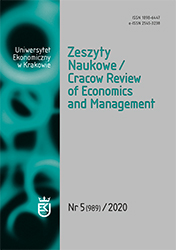Digitalisation of the Economy as a Factor in Increasing State Competitiveness
Digitalisation of the Economy as a Factor in Increasing State Competitiveness
Author(s): Nazar Podolchak, Olena Bilyk, Mariia KhimSubject(s): Politics / Political Sciences, Social Sciences, Economy, National Economy, Business Economy / Management, ICT Information and Communications Technologies
Published by: Wydawnictwo Uniwersytetu Ekonomicznego w Krakowie
Keywords: digital economy; digitalisation; digital services; digital technologies; information and communication technologies; state; society
Summary/Abstract: Objective: The article considers the main challenges and benefits of digitalisation of Ukraine’s economy, outlines the threats and risks posed by this process, to develop tools and digital transformation plans for assessing the level of digital economy in Ukraine. Research Design & Methods: A retrospective analysis of the economic and social development of the states in question is conducted. It takes into account the implementation of digitalisation and use of medium-term budget planning. A ranking method is used to display the change in the rank of the states in 2019 vs 2009. It employs the following indicators: gross domestic product at current prices, gross domestic product per capita at current prices, unemployment, national income, total expenditure of public administration, and the network readiness index. Findings: The research makes it possible to draw conclusions about the need to create conditions for digitalisation in Ukraine. The ability to use digital resources has proven effective during the COVID-19 pandemic. More generally, we assessed the macroeconomic effect by assessing the impact of investment in digital technologies and digital infrastructure on GDP, as well as by assessing productivity growth through digitalisation. According to the estimates cited in this article, the share of the digital economy in the GDP of the world’s largest countries in 2030 will reach 50–60%. In Ukraine, the figure may run even higher, to 65% of GDP (in the implementation of the forced scenario of the digital economy in Ukraine). Implications / Recommendations: Based on the conducted research, two scenarios for the development of digitalisation in Ukraine are put forward: 1) accelerated digitalisation and 2) gradual digitalisation. If scenario 2 is implemented, Ukraine’s economy will remain inefficient, labour migration and brain drain will continue, and Ukrainian products will become less competitive in foreign markets. Ukraine will remain in the backyard of civilisation. Scenario 1 envisages the transition of the Ukrainian economy to a digital one in 3–5 years. Under the implementation of the forced scenario, by 2030 Ukraine will become a European leader in innovation and new technologies, and an intellectual hub. Contribution: The research conducted by the authors will allow to establish the main directions of development of the digitalisation of Ukraine’s economy on the basis of European experience, while the proposed development scenarios will help to create the most attractive conditions in the region for the development of human potential.
Journal: Zeszyty Naukowe Uniwersytetu Ekonomicznego w Krakowie
- Issue Year: 989/2020
- Issue No: 5
- Page Range: 7-30
- Page Count: 24
- Language: English

